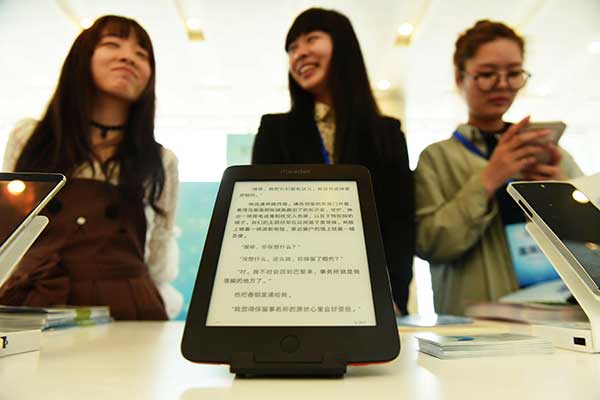Readers on rise, mostly in digital
 |
|
[Photo by Long Wei/Asianewsphoto] |
Chinese adults read an average of just under eight books in 2016 - a tiny increase of 0.02 percent over 2015 - while a rapid increase of 6.1 percent was seen in the number of people reading digital content.
"We've seen fast growth in digital reading for eight consecutive years," said Wei Yushan, head of the Chinese Academy of Press and Publication, who announced the academy's major findings from the 14th survey of Chinese reading habits on Tuesday, ahead of World Book Day, which falls on Sunday.
Of the nearly eight books read by an average adult in 2016, about five were in print form and three were digital. Wei said similar surveys of readers from European countries and the United States show that they read 10 titles a year, while Japanese read 12.

"Considering our huge population base, we lag behind the world's top level, but we're making small and steady growth every year," Wei said.
Xu Shengguo, head of the academy's Institute of Publishing Research, said the growing number and better management of physical bookstores, rising awareness of the value of reading habits and stronger governmental support are changing the scene.
China's leadership has been promoting the idea of a country of avid readers since 2006. The notion has appeared in the Government Work Report four times since 2014.
The academy has been conducting the survey since 1999.
It surveyed 22,415 people in 52 cities and townships in 29 provincial-level regions. Both urban and rural areas were included. Different questionnaires were given to adults and children. The survey was conducted over eight months.
It found regular adult readers up 0.3 percent to 79.9 percent, with 85 percent of those under 17 reporting frequent reading. Those aged 14 to 17 read most - more than nine books a year.
Ninety percent of parents read to or with their children.
About 62 percent of Chinese read on WeChat, a mobile app - an increase of 10.5 percent. They spent an average of 26 minutes on it, 3.4 minutes more than that in 2015, Wei said.
The survey also found that more than 17 percent of Chinese used audio books last year, a fairly new trend. Romance, history, languages and lectures were the favored audio content.























